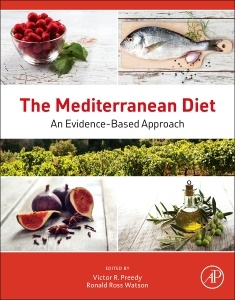Description
The Mediterranean Diet
An Evidence-Based Approach
Coordinators: Preedy Victor R, Watson Ronald Ross
Language: English
Subjects for The Mediterranean Diet:
Keywords
<; P>; disease prevention; endocrinology; vitamins; nutrients; nutraceuticals; antioxidant properties <; /P>
Publication date: 10-2018
698 p. · 21.4x27.6 cm · Paperback
Replaced by new edition: Access to the new edition.
Publication date: 11-2014
698 p. · 21.4x27.6 cm · Hardback
Replaced by new edition: Access to the new edition.
Description
/li>Contents
/li>Readership
/li>Biography
/li>Comment
/li>
The Mediterranean Diet offers researchers and clinicians a single authoritative source which outlines many of the complex features of the Mediterranean diet: ranging from supportive evidence and epidemiological studies, to the antioxidant properties of individual components. This book embraces a holistic approach and effectively investigates the Mediterranean diet from the cell to the nutritional well-being of geographical populations. This book represents essential reading for researchers and practicing clinicians in nutrition, dietetics, endocrinology, and public health, as well as researchers, such as molecular or cellular biochemists, interested in lipids, metabolism, and obesity.
Section 1: The Mediterranean diet: concepts and general aspects
Section 2: Components of the Mediterranean diet
Section 3: Health and nutritional aspects of the Mediterranean diet; with subsections on Metabolism; Metabolic Syndrome; Obesity and Diabetes; Cardiovascular Disease; Cancer; Brain and Behaviour; Immunology; Life Stages; Organs and Applications; and Adverse Effects
Section 4: Novel nutraceuticals and edible plants used in the Mediterranean region
58 chapters total
: Researchers and practicing clinicians in nutrition, dietetics, endocrinology, and public health, as well as researchers, such as molecular or cellular biochemists, interested in lipids, metabolism, and obesity.
Ronald Ross Watson, PhD, is Professor of Health Promotion Sciences at the University of Arizona, Mel and Enid Zuckerman College of Public Health. Dr. Watson began his research in public health at the Harvard School of Public Health as a Fellow in 1971 doing field work on vaccines in Saudi Arabia. He has done clinical studies in Colombia, Iran, Egypt, Saudi Arabia and the United States which provides a broad international
- Presents one comprehensive, translational source for all aspects of how the Mediterranean diet plays a role in disease prevention and health
- Experts in nutrition, diet, and endocrinology (from all areas of academic and medical research) take readers from the bench research (cellular and biochemical mechanisms of vitamins and nutrients) to new preventive and therapeutic approaches
- Features a unique section on novel nutraceuticals and edible plants used in the Mediterranean region




